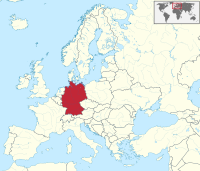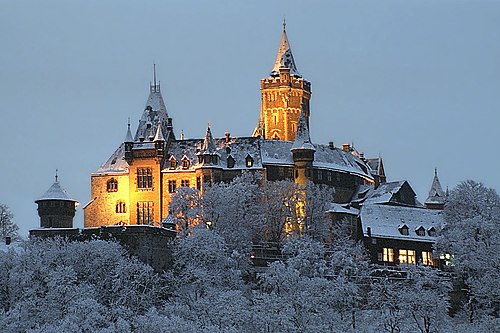Welcome to the Germany Portal!
Willkommen im Deutschland-Portal!

|

|

| |
Germany (German: Deutschland), officially the Federal Republic of Germany, is a country in Central and Western Europe, lying between the Baltic and North Seas to the north and the Alps to the south. It borders Denmark to the north, Poland and the Czech Republic to the east, Austria and Switzerland to the south, France to the southwest, and Luxembourg, Belgium and the Netherlands to the west.
Germany includes 16 constituent states, covers an area of 357,578 square kilometres (138,062 sq mi) and has a largely temperate seasonal climate. With 83 million inhabitants, it is the second most populous state of Europe after Russia, the most populous state lying entirely in Europe, as well as the most populous member state of the European Union. Germany is a very decentralized country. Its capital and largest metropolis is Berlin, while Frankfurt serves as its financial capital and has the country's busiest airport.
In 1871, Germany became a nation-state when most of the German states unified into the Prussian-dominated German Empire. After World War I and the Revolution of 1918–19, the empire was replaced by the parliamentary Weimar Republic. The Nazi seizure of power in 1933 led to World War II, and the Holocaust. After the end of World War II in Europe and a period of Allied occupation, two new German states were founded: West Germany, formed from the American, British, and French occupation zones, and East Germany, formed from the western part of the Soviet occupation zone, reduced by the newly established Oder-Neisse line. Following the Revolutions of 1989 that ended communist rule in Central and Eastern Europe, the country was reunified on 3 October 1990.
Today, Germany is a federal parliamentary republic led by a chancellor. It is a great power with a strong economy. The Federal Republic of Germany was a founding member of the European Economic Community in 1957 and the European Union in 1993. Read more...
Selected article

Karl Marx (5 May 1818 – 14 March 1883) was a German scientist, philosopher, economist, sociologist, journalist, and revolutionary socialist. Born in Trier to a middle-class family, he later studied political economy and Hegelian philosophy. As an adult, Marx became stateless and spent much of his life in London, England, where he continued to develop his thought in collaboration with German thinker Friedrich Engels and published various works, the most well-known being the 1848 pamphlet The Communist Manifesto. His work has since influenced subsequent intellectual, economic, and political history.
Marx's theories about society, economics and politics—collectively understood as Marxism—hold that human societies develop through class struggle; in capitalism, this manifests itself in the conflict between the ruling classes (known as the bourgeoisie) that control the means of production and working classes (known as the proletariat) that enable these means by selling their labour for wages. Through his theories of alienation, value, commodity fetishism, and surplus value, Marx argued that capitalism facilitated social relations and ideology through commodification, inequality, and the exploitation of labour. Employing a critical approach known as historical materialism, Marx propounded the theory of base and superstructure, asserting that the cultural and political conditions of society, as well as its notions of human nature, are largely determined by obscured economic foundations. These economic critiques were set out in influential works such as the three volumes, published between 1867 and 1894, that comprise Das Kapital. More...
Selected picture
Related portals
- Parent portals
- Regional
- History
 Holy Roman Empire (900–1806)
Holy Roman Empire (900–1806) East Germany (1949–1990)
East Germany (1949–1990)
- Neighbouring countries
Anniversaries for May 10

- 1521 - Death of humanist and satirist Sebastian Brant, author of the Ship of Fools
- 1566 - Death of botanist Leonhart Fuchs
- 1760 - Birth of poet Johann Peter Hebel
- 1878 - Birth of politician Gustav Stresemann, Chancellor of Germany 1923 and recipient of the 1926 Nobel Peace Prize
- 1933 - Nazis and like-minded professors and students start the book burning on the Opernplatz in Berlin
Did you know...
- ... that Oksana Lyniv founded the Youth Symphony Orchestra of Ukraine in 2016 and conducted them in thirty concerts across ten music festivals in 2022?
- ... that a reviewer described the approach of soprano Magdalena Hinterdobler to her role as Grete in Zemlinsky's Der Traumgörge as "bold" and "sassy"?
- ... that Thomas Mann insisted on omitting a passage on homoeroticism in the English translation of his work "On the German Republic"?
- ... that Heike Heubach became the first deaf member of the German Bundestag?
- ... that in opposition to his parents, opera star Joseph Schwarz began his career by running away from home to join a band of traveling minstrels?
- ... that Robert Winterberg's 1911 operetta Die Dame in Rot was adapted into English for Broadway?
- ... that in 1933 Nazi sympathisers attempted to kidnap two German-Jewish filmmakers in Liechtenstein?
- ... that in just one night, thousands of books on the experiences and medical care of transgender people in Nazi Germany were burned for being "un-German"?
Selected cuisines, dishes and foods
Topics
Categories
Things you can do

A list of articles needing cleanup associated with this project is available. See also the tool's wiki page and the index of WikiProjects.
Here are some tasks you can do. Please remove completed tasks from the list.
- Requests: Columbiahalle, German Archaeological Institute at Rome, Deutsche Familienversicherung, Dietlof von Arnim-Boitzenburg, Hennes Bender, Georg Bernhard (1875–1944), Eduard Georg von Bethusy-Huc, Rolf Brandt (1886–1953), Jan Philipp Burgard, Georg Arbogast von und zu Franckenstein, Ferdinand Heribert von Galen, Herbert Helmrich, Monty Jacobs (1875–1945), Hans Katzer, Siegfried Kauder, Heide Keller, Matze Knop, Isidor Levy (1852–1929), Markus Löning, Anke Plättner, Hans Heinrich X. Fürst von Pless, Gerd Poppe, Victor-Emanuel Preusker, Hans Sauer (inventor), Franz August Schenk von Stauffenberg, Paul Schlesinger (1878-1928),Oscar Schneider, Hajo Schumacher, Otto Theodor von Seydewitz, Dorothea Siems, Werner Sonne, Anton Stark, Udo zu Stolberg-Wernigerode, Christoph Strässer, Torsten Sträter, Joseph von Utzschneider, Jürgen Wieshoff, Hans Wilhelmi,
- Unreferenced: Unreferenced BLPs, Bundesautobahn 93, Benjamin Trinks, Steeler (German band), Amelie Beese, Zoologisches Museum in Kiel, Emil Krebs, Prussian semaphore system, Partenstein, Peter Krieg, Porsche 597, Christa Bauch, Curt Cress, Stefan Beuse
- Cleanup: 53541 issues in total as of 2024-03-03
- Translate: Articles needing translation from German Wikipedia
- Stubs: Albersdorf, Thuringia, Ingo Friedrich, Berndt Seite, Federal Social Court; 108 articles in Category:German MEP stubs
- Update: Deutsches Wörterbuch
- Portal maintenance: Update News, Did you know, announcements and the todo list
- Orphans:
Orphaned articles in Germany

- Photo: Take/Add requested photographs
- Expression error: Unrecognized punctuation character ",".
Associated Wikimedia
The following Wikimedia Foundation sister projects provide more on this subject:
-
Commons
Free media repository -
Wikibooks
Free textbooks and manuals -
Wikidata
Free knowledge base -
Wikinews
Free-content news -
Wikiquote
Collection of quotations -
Wikisource
Free-content library -
Wikiversity
Free learning tools -
Wikivoyage
Free travel guide -
Wiktionary
Dictionary and thesaurus












































